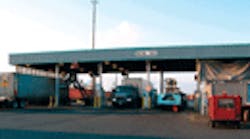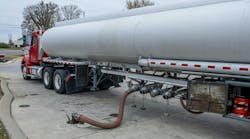A panel hearing is scheduled for today in Oakland, CA, to give truckers hauling in and out of the area port the opportunity to voice their concerns about the impact of the scheduled Phase II, emissions-related upgrades for drayage trucks that are currently mandated by the California Air Resources Board (CARB) under the statewide drayage truck regulations which went into effect in 2007.
Alameda County supervisors Nate Miley and Scott Haggerty will be co-chairing the panel from 1 to 3:30 p.m. (Pacific) in Oakland at the Alameda County Board of Supervisors Chambers, 1221 Oak St., 5th Floor.
“It’s important to take a critical look at policy decisions that could bring a devastating loss to our local economy and hardship to small, independent port truckers,’’ said Miley, who is also president of the Alameda County Board of Supervisors.
Since 2007, trucks with model year 1993 engines or older have been banned from California ports and trucks with 1994-2003 engines have had to be ungraded with particulate filters in order to keep operating at the ports. Under the next phase of the regulations, truckers operating Class 8 vehicles with 2004 model engines will also be required to reduce particulate emissions by 85% before Jan. 1, 2012, via the addition of an approved particulate filter. The following year, trucks with 2005-2006 engines will likewise have to be retrofit. Before 2014, all these vehicles will have to be fully compliant with 2007 EPA emissions standards or be replaced.
“Some 4,400 trucks will be affected by the Phase II requirements,” Ronald Light, executive director of the West State Alliance and an invited panelist, told Fleet Owner. “There are still another 2,700 trucks at the port that will need particulate filters to comply with Phase II. It just does not make sense to have to retrofit a truck now that will have to be replaced in 18 months. Small, independent port truckers are being hit twice in rapid succession to comply with CARB environmental regulations. They need a more natural process to gradually get rid of old trucks and, over time, replace them with new models.”
According to Light, today’s panel discussion will specifically focus on a recent CARB decision not to adopt staff-proposed modifications that would have delayed the next phase of drayage truck compliance.
“We have been lead to believe that the two county supervisors, the Port of Oakland and other local officials have very strong sympathies with the [port truckers],” he added. “Our hope as an organization is that the CARB staff and Board can revisit their Dec. 17 decision [not to delay the Phase II requirements] as a matter of internal policy. We hope they will see the merits of a delay.”
Other invited panel members for the hearing include officials from the Air Quality Management District, the Port of Oakland, CARB, Lawrence Berkeley National Lab, Coalition for Clean & Safe Ports, Cal/OSHA, the Division of Occupational Safety and Health, Alameda County Board of Supervisors and City of Oakland elected officials.




